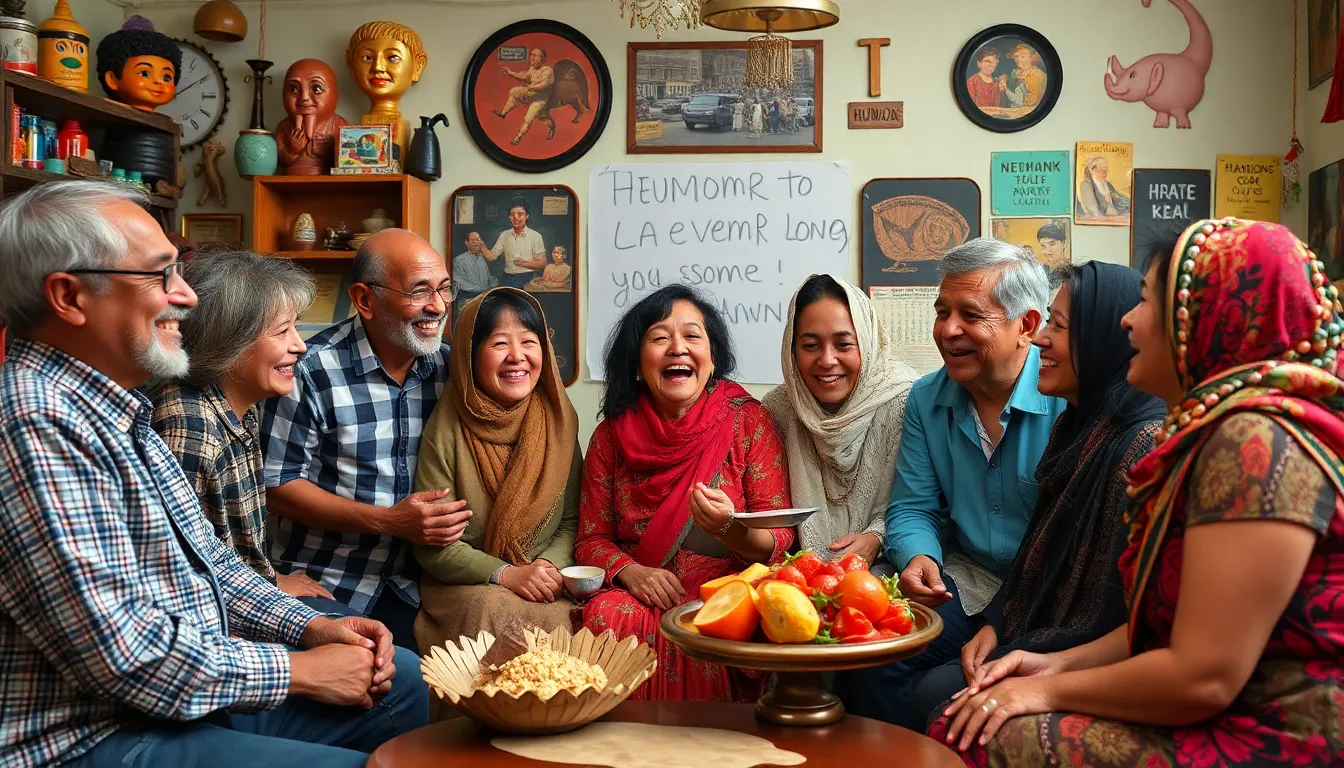Laughter isn’t just a reaction; it’s a window into our values. Every joke tells a story, revealing what we hold dear, what we find absurd, and what we dare to challenge. From the punchline that makes you chuckle to the witty quips that provoke thought, humor reflects the fabric of society.
Table of Contents
ToggleUnderstanding Jokes and Values
Jokes offer insight into societal values, reflecting beliefs and priorities. Understanding humor aids in grasping cultural dynamics.
The Nature of Humor
Humor operates as a mechanism for social commentary. It highlights shared experiences and disparities within societies. Laughter can challenge norms, while simultaneously reinforcing group identity. People often use humor to cope with discomfort or tension. This approach can make serious issues more approachable. Ultimately, humor serves as a tool to convey complex ideas in relatable ways.
Types of Jokes
Jokes come in various forms, each conveying different values. Knock-knock jokes emphasize simplicity and playfulness, appealing to a broad audience. Satire critiques societal norms, often highlighting hypocrisy or injustice. Observational humor draws from everyday experiences, connecting shared values through common realities. Wordplay showcases creativity and linguistic skill, marking intelligent wit. Dark humor can challenge taboo subjects, prompting reflection on societal boundaries. Each type of joke reveals values embedded within culture, offering a lens into collective beliefs.
The Role of Culture in Comedy

Culture plays a fundamental role in shaping the humor of a society. Jokes often rely on cultural references that resonate within a specific community.
Cultural References in Jokes
Cultural references in jokes reveal shared knowledge and values. They highlight practices, beliefs, or events familiar to a particular audience. For instance, humor that references popular films or local traditions speaks to collective experiences. It establishes a bond between the teller and the audience, creating a sense of belonging. Regional dialects and folklore also enrich comedic content, reflecting how local history influences humor. Specific references, when understood, deepen the impact of the joke and underscore the audience’s cultural context.
Cross-Cultural Perspectives on Humor
Cross-cultural perspectives on humor exhibit how different societies navigate similar themes. While some jokes resonate universally, others require cultural context for appreciation. Audiences from diverse backgrounds might interpret humor differently, influenced by their values. For example, satire might be embraced in one culture, while viewed as offensive in another. Understanding these nuances fosters better appreciation of global humor. Additionally, global interactions increasingly mix cultural influences, creating a rich tapestry of comedic expression. This cross-pollination broadens audiences’ perspectives on values, fostering empathy and understanding across cultural divides.
Analyzing Jokes as Social Commentary
Jokes often serve as powerful vehicles for social commentary. By examining comedic elements, one gains insight into prevailing attitudes and beliefs within a society.
Satire and Its Impact
Satire plays a crucial role in exposing societal flaws. It employs humor to critique politics, behaviors, and cultural norms, prompting audiences to reflect critically. Comedians like Jon Stewart and John Oliver expertly use satire to engage viewers while providing commentary on complex issues. This approach fosters discussions surrounding injustice and encourages audiences to question authority. Consequently, satire not only entertains but also educates, driving awareness and change through laughter.
Jokes Reflecting Societal Norms
Societal norms often influence the content of jokes. Comedy routines frequently mirror collective values and highlight acceptable behaviors. For instance, observational humor identifies everyday situations, illustrating shared experiences that people relate to. In doing so, comedians reinforce community bonds while reflecting mutual understanding. Regional humor also showcases local customs, uniquely tailoring content to specific audiences. Such variations further highlight cultural differences while promoting appreciation for diverse perspectives within humor.
How Jokes Reveal Values
Jokes function as reflections of societal values, offering insights into what different communities prioritize. Through humor, individuals express shared beliefs, cultural norms, and the absurdities of daily life.
Values Expressed Through Humor
Values expressed through humor vary widely among communities. Community members often convey what they cherish or challenge through specific types of jokes. For instance, light-hearted jokes might celebrate friendship and loyalty, while satirical humor often targets injustice or societal flaws. Observational humor reveals everyday experiences, emphasizing relatability and prompting laughter. By laughing at shared situations, people reinforce cultural bonds while exposing their values.
Case Studies of Noteworthy Jokes
Noteworthy jokes highlight the intricate relationship between humor and societal values. For example, political satire frequently critiques authority, prompting discussions about governance. Comedian John Oliver often uses humor to address issues like climate change and healthcare, encouraging critical thinking among viewers. Another example can be seen in the classic “I’m not arguing, I’m just explaining why I’m right” joke, showcasing how humor reflects confidence and individualism. Each of these examples underscores how humor can spark dialogue and illuminate core societal beliefs.
Jokes serve as a mirror reflecting the values and beliefs of society. Through humor, individuals can explore complex issues while fostering connections within their communities. The interplay between cultural context and comedic expression reveals not only shared experiences but also the nuances that define different groups.
As humor continues to evolve in a globalized world, it remains a vital tool for social commentary. By engaging with jokes, people can challenge norms and spark meaningful conversations about the values that shape their lives. Ultimately, laughter not only entertains but also deepens understanding of the cultural dynamics at play, enriching the human experience.




